I’m driving on a wet Highway 128 in California’s wine country and the cacophony behind me is coming from 4.0 liters of German flat-6 unfettered by considerations like sound deadening material. The 911 GT3 has traditionally been the lightweight, naturally aspirated choice in the 911 lineup, but the limited-edition 911 S/T looks at the GT3 and says, “You think you’re the raw, purist’s car? Hold my beer.”
The engine making all that noise comes from the 911 GT3 RS, but it’s not teamed with that car’s vast array of aerodynamic add-ons and numerous controls for track adjustments. Instead, the S/T aims to out-GT3 the 911 GT3 with even lighter weight and an even more engaging driving experience.
As it revs, the S/T’s engine sounds a racket that’s louder than any other 911. The flat-6’s wail fills the cabin to the detriment of conversation and the delight of car enthusiasts. It has so little sound deadener that the whir and lash of various powertrain parts can be heard, including flywheel rattle. The sound increases with revs, only calming down at low rpm. However, low revs aren’t as common due to shorter gearing.
2024 Porsche 911 S/T

2024 Porsche 911 S/T
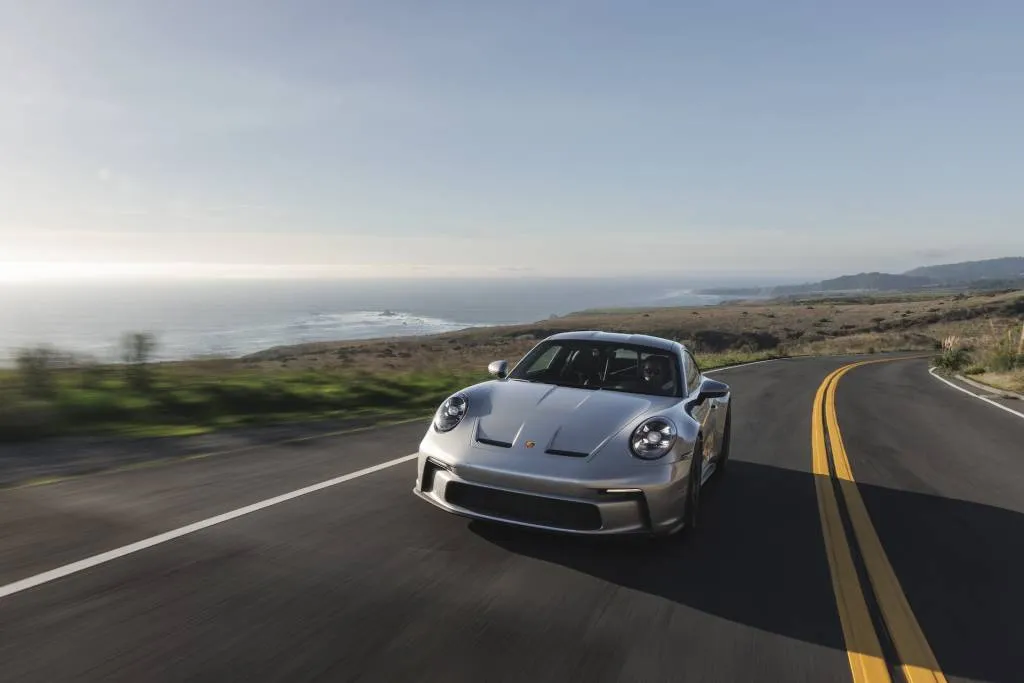
2024 Porsche 911 S/T
Like in the GT3 RS, the engine makes 518 hp and 342 lb-ft of torque, up from 502 hp in the standard GT3. However, instead of a dual-clutch automatic transmission, here it’s mated to a 6-speed manual that’s teamed with a short-throw shifter, a lightweight flywheel, and shorter gear ratios. It’s a formula for powertrain engagement unlike anything in the 911 lineup. It’s all louder, quicker, more intense, and more visceral.
The S/T’s flywheel weighs 22 pounds less than the unit in the manual version of the GT3. The result is a freer revving version of the 4.0-liter flat-6 that winds readily up to its 9,000 rpm redline. The gear ratios are 8% shorter than in the manual GT3, and the shifter is 10 mm shorter than the short-throw shifter in the GT3, which is already 10 mm shorter than the levers in other 911s. Tidy gear shifts are helpful because the light clutch drops the revs much more quickly between gears (a standard rev-matching feature helps as well), but it all encourages railing on the S/T like you stole it.
The powertrain mods and the S/T’s lighter weight conspire to make it the fastest naturally aspirated 911 in the 0-60 mph sprint. It does the deed in just 3.2 seconds, according to Porsche, 0.2 second quicker than the GT3. Power comes on strong from a stop but feels even more robust as it relentlessly builds speed. A shorter final-drive ratio limits the top speed to 186 mph, 12 mph less than the GT3, but with the way it revs you can bet it would beat the GT3 to 186 mph handily.
Two other cuts to rotating mass contribute to that improved acceleration as well as to handling. The S/T comes standard with carbon-ceramic brakes that save 39.9 pounds and magnesium wheels that trim 23.3 pounds.
Other forms of weight savings are found throughout the car. A lithium-ion battery saves 6.6 pounds over a lead-acid unit and a lightweight carpet conserves 4.4 pounds. Carbon-fiber reinforced plastic (CFRP) cuts weight for the rear shear panel (4.6 pounds), rear anti-roll bar (4.4 pounds), doors (4.4 pounds), bucket seats (15.4 pounds) and roof (2.2 pounds). The S/T also lacks a rear seat like other GT3s, and cutting the GT3 Touring’s standard rear-wheel steering drops another 14.3 pounds. All told, the S/T weighs in at 3,056 pounds, 70 pounds less than the GT3 Touring, making it the lightest 911 in the lineup.
The lack of rear-wheel steering is one of a few dynamic changes Porsche employs for the S/T. The engineers slowed the steering ratio from 14.2:1 to 15.0:1 to compensate for the lack of stability rear-wheel steering adds in fast corners. It’s all part of the back-to-basics approach for the car, which is punctuated by a lack of driving modes, though the damper tuning can be changed on the center screen.

2024 Porsche 911 S/T

2024 Porsche 911 S/T

2024 Porsche 911 S/T
I can feel the free-revving powertrain on these roads, but judging most of the handling improvements will have to wait for a warmer, drier day than today’s 45 degrees and rain. The steering still has lots of feel and a nice heft, and I don’t notice slower turn-in due to the adjusted steering ratio. While the 255/35R20 front and 315/30R21 rear Pirelli P Zero Corsa summer tires are doing a yeoman’s job of gripping the slick surface, pushing it too hard will send the S/T careening into a vineyard or redwood tree.
That’s OK, because we already know even base versions of the 911 are unflappable on a canyon road or racetrack, with a flat attitude through corners, agile moves, prodigious grip, and a stability that belies its rear-engine design. Take weight out of the powertrain, body, and wheels and it only gets better.
I get a few miles in a 911 GT3 Touring during the drive and the difference in ride quality becomes evident. While the S/T feels more raw than the GT3 Touring in almost every way, it rides better. It has specific, softer tuning for the dampers, as well as its own settings for the stability control and differential locking values. A Porsche engineer told me that the dampers have been tuned to be just as firm at full compression but to be freer on rebound to better follow the road surface. As a result, the car can still pound over sharp ruts, but it’s more forgiving on lesser road imperfections.
Despite its lighter weight, the S/T is not a competitor for the 911 GT3 RS and won’t beat that car on a racetrack. In addition to its many chassis adjustments, the GT3 RS has numerous aerodynamic add-ons to create 1,895 pounds of downforce at 177 mph. The S/T has the simpler GT3 Touring’s body with an active rear spoiler that deploys at 80 mph. A standard Gurney flap adds some downforce, but Porsche doesn’t bother to say how much, as the brand views the S/T as the ultimate street car rather than a track car. That means the GT3 RS will be able to carry more speed through fast corners as the downforce helps the car stick to the pavement.
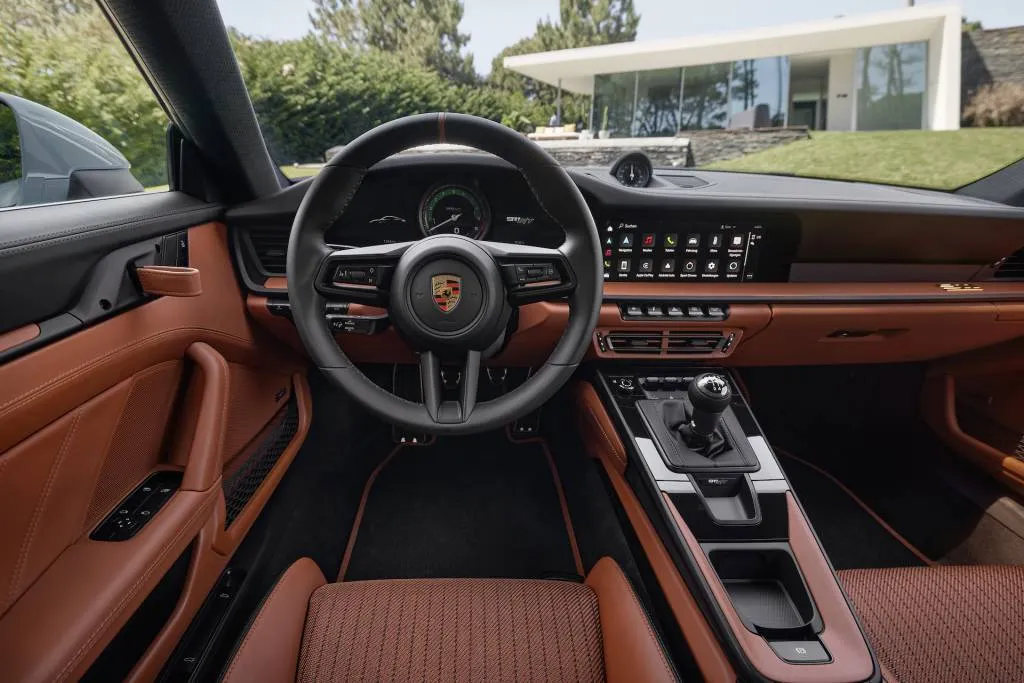
2024 Porsche 911 S/T
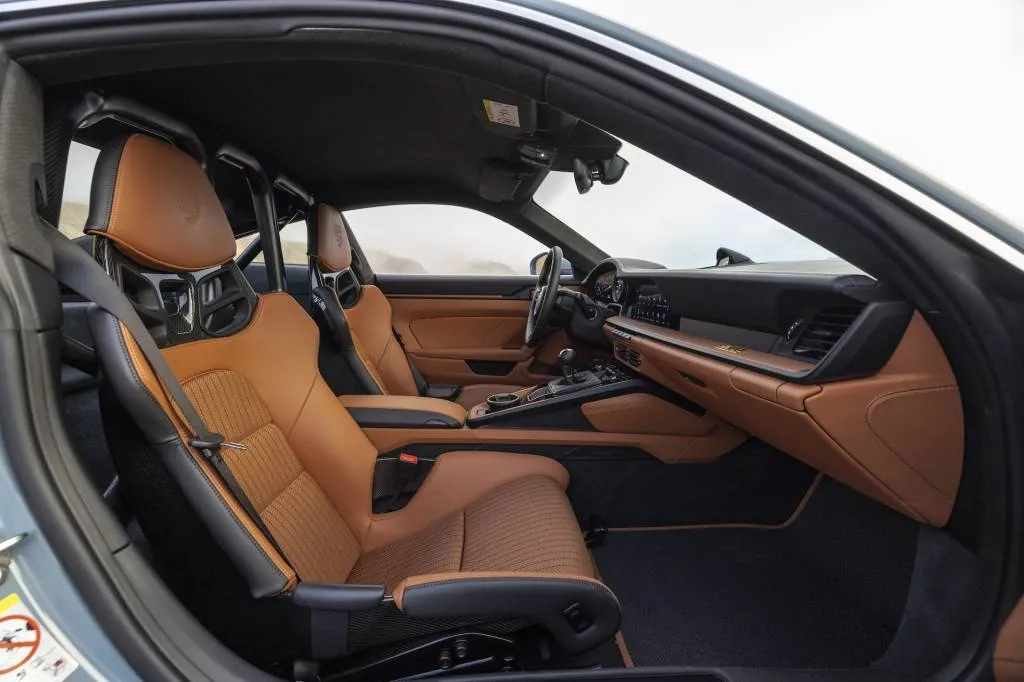
2024 Porsche 911 S/T
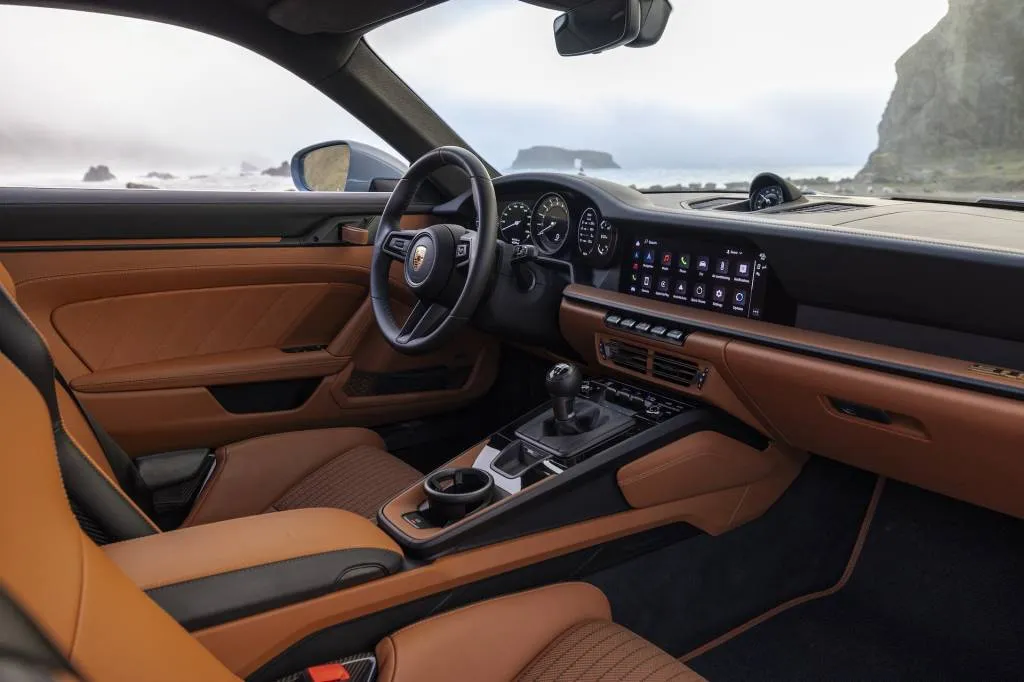
2024 Porsche 911 S/T
I’m taking it all in from a cabin that combines minimalism with connectivity and a few special touches. It has only two seats, and they’re almost skeletal, with CFRP shells and only four-way adjustments. Still, they’re well formed to create an ideal performance driving seating position, and they’re wide enough for bigger backsides. The instrument cluster has Phosphorous Green graphics, and so does the digital clock on the dash.
Porsche is releasing the 911 S/T as part of a 60th-anniversary celebration for the 911, and is limiting the car to 1,963 world-wide sales in honor of the year of the 911’s release. The S/T is inspired by a track package Porsche offered for the 911 S beginning in 1969, which was known internally as the ST.

2024 Porsche 911 S/T

2024 Porsche 911 S/T

2024 Porsche 911 S/T
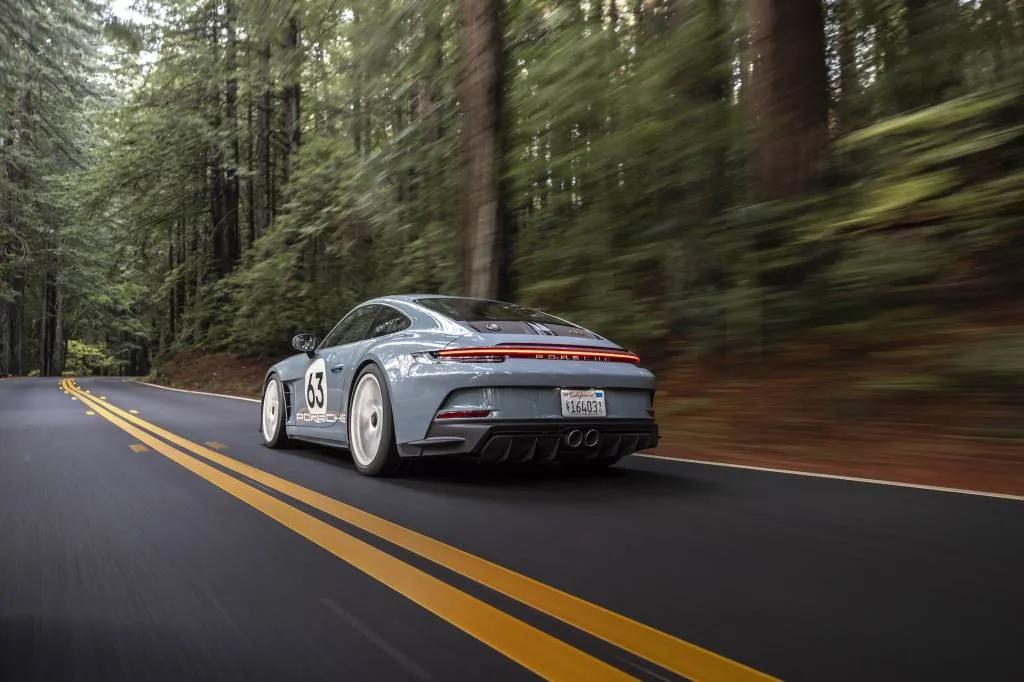
2024 Porsche 911 S/T
All of this comes at a hefty cost. In the U.S., each ST will run $291,650, or $105,000 more than the GT3 Touring. If you’re going to spend that much, spring for the extra $20,360 for the Heritage Design Package that adds door gumballs with any number from 0-99, an available Shore Blue Metallic paint (pictured on the no. 63 cars in the photos), classic-style Porsche crests inside and out, two-tone black/Classic Cognac semi-aniline leather with cloth seat inserts, and gold S/T and 911 badges on the rear.
As a limited-edition car, buyers who get an allocation will be tempted to buy it and flip it. To combat this, customers will be required to lease the car for the first year, which will also encourage them to drive it. After that, they will have the opportunity to buy it.
And customers will want to drive it when deliveries begin next spring. The way the 911 S/T revs so willingly, the way the engine screams “let’s go,” the way the light flywheel encourages speed shifting, and an upgrade on the standard 911’s handling all beg owners to drive this car and drive it hard. The 911 S/T is a raw nerve of a car, with a sound that may get on passengers’ nerves but will be music to the ears of Porsche fans.
Porsche paid for travel and lodging for Motor Authority to bring you this firsthand report.
